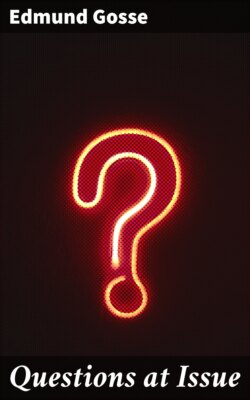Читать книгу Questions at Issue - Edmund Gosse - Страница 3
Preface
ОглавлениеTo the essays which are here collected I have given a name which at once, I hope, describes them accurately and distinguishes them from criticism of a more positive order. When a writer speaks to us of the works of the dead masters, of the literary life of the past, we demand from him the authoritative attitude. That Homer is a great poet, and that the verse of Milton is exquisite, are not Questions at Issue. In dealing with such subjects the critic must persuade himself that he is capable of forming an opinion, and must then give us his opinion definitely. But in the continent of literary criticism, where all else is imperial, there is a province which is still republican, and that is the analysis of contemporary literature, the frank examination of the literary life of to-day.
In speaking of what is proceeding around us no one can be trusted to be authoritative. The wisest, clearest, and most experienced of critics have notoriously been wrong about the phenomena of their own day. Ben Jonson selected the moment when Hamlet and Othello had just been performed to talk of raising "the despised head of poetry again, and stripping her of those rotten and base rags wherewith the times have adulterated her form." Neither Hazlitt nor Sainte Beuve could be trusted to give as valuable a judgment on the work of a man younger than themselves as they could of any past production, be it what it might. To map the ground around his feet is a task that the most skilful geographer is not certain to carry out with success.
The insecurity of contemporary criticism is no reason, however, why it should not be seriously and sincerely attempted. On the contrary, the critic who has been accustomed to follow paths where the laws and criteria of literature are paramount, may be glad to slip away sometimes to a freer country, where the art he tries to practise is more instinctive, more emotional, and more controversial. In the schools of antiquity, when the set discourse was over, the lecturer mingled with his audience under the portico of the Museum, and then, I suppose, it was not any longer of the ancients that they talked, but of the poet of last night, and of the rhetorician of to-morrow.
The critic may enjoy the sense of having abandoned the lecturing desk or the tribune, and of mingling in easy conversation with men who are not bound to preserve any decorum in listening to his opinions. In the criticism of the floating literature of the day an opportunity is offered for sensibility, for the personal note, even for a certain indulgence in levity or irony. The questions of our own age are not yet settled by tradition, nor hedged about with logical deductions; they are still open to discussion; they are still Questions at Issue. Such are all the aspects of the literary life which I endeavour to discuss in this volume of essays.
There can, nevertheless, be no reason why, although the dress and attitude be different, the critic should not be as true to his radical conceptions of right and wrong in literature, when he discusses the shifts and movements about him, as when he "bears in memory what has tamed great nations." The attention of a literary man of character may be diverted to a hundred dissimilar branches of his subject, but in dealing with them all he should be the servant of the same ideas, the defender of the same principles, the protector of the same interests. The battle rages hither and thither, but none of the issues of it are immaterial to him, and his attitude towards what he regards as the enemies of his cause should never radically alter. His functions should rather become more active and more militant when he feels that his temporary position deprives him of accidental authority; and even when he admits that the questions he discusses are matters of open controversy, he should, in bringing his ideas to bear upon them, be peculiarly careful to obey the orders of fundamental principles. All this is quite compatible, I hope, with the sauntering step, the conversational tone, the absence of all pedagogic assertion, which seem to me indispensable in the treatment of contemporary themes.
Of the essays here reprinted, nearly half are practically new to English readers, having been written for an American review, and having been quoted only in fragments on this side of the Atlantic. At the close of the volume I have added a Lucianic sketch, which, when it appeared anonymously in the Fortnightly Review, enjoyed the singular and embarrassing distinction of being attributed, in succession, to four amusing writers, each of whom is deservedly a greater favourite of the public than I am. I have seen this little extravaganza ticketed with such eminent names that I almost hesitate to have to claim it at last as my own. I hope there was none but very innocent fooling in it, and that not a word in it can give anybody pain. I think it was not an unfair representation of what literature in England, from a social point of view, consisted two years ago. Already death has been busy with my ideal Academy, and no dreamer of 1893 could summon together quite so admirable a company as was still citable in 1891.
London, April 1893.
